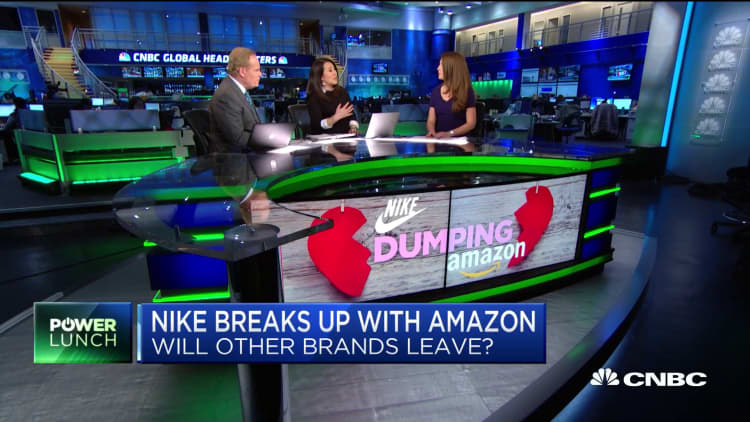Under Armour is calling for sales to drop in 2020, as it struggles to rally shoppers behind its sweat-wicking shirts and training sneakers, faced with heightened competition from Nike and Lululemon.
The company also said Tuesday it could take a hit during the first quarter of fiscal 2020 of as much as $60 million in lost sales from the deadly coronavirus.
Its shares were recently tumbling more than 17%, after Under Armour's fourth-quarter sales came up short of analysts' estimates.
Here's how Under Armour did for the quarter ended Dec. 31, compared with what analysts were expecting, based on a poll by Refinitiv:
- Earnings per share: 10 cents, adjusted, vs. 10 cents expected
- Revenue: $1.44 billion vs. $1.47 billion expected
Under Armour said it expects the coronavirus outbreak in China to lower sales by roughly $50 million to $60 million during the fiscal first-quarter. It has about 600 shops in China.
The athletic apparel-maker has been struggling to grow sales for the past few years. Following more than two decades of quarterly revenue growth of more than 20%, it reported its first quarterly loss in 2017, as momentum for the brand started to slow. It faces intense competition from Nike, Lululemon and Adidas in the U.S., which have created more fashionable workout gear to reach younger consumers, while Under Armour has stuck to performance.
It also is more reliant on wholesale partners, such as Kohl's, which analysts say has hurt Under Armour's business because those retailers have suffered, and many of them push promotions consistently. Many of Under Armour's rivals, such as Nike and Lululemon, have been investing in selling as much as possible directly to customers, bypassing middlemen.
As a result, Under Armour's merchandise is often heavily discounted, hurting profits.
"We believe prior promotional activity has impacted the consumers' willingness to pay full price for our brand to a higher degree than we originally anticipated," CEO Patrik Frisk told analysts Tuesday.
He said Under Armour faces "ongoing demand challenges" for its apparel and sneakers, and he predicted sales to be down by a low-single digit percentage in fiscal 2020. That includes a high-single-digit drop in sales in North America, Under Armour said. Analysts had been calling for overall sales to be up 4.2% for the year.
The company is embarking on a restructuring plan, which among other things could entail not opening its New York City flagship location. It said it could take pretax charges of $325 million to $425 million this fiscal year tied to these efforts, including about $225 million to $250 million related to not opening the store.
"The Fifth Avenue location is obviously a premier retail location, but we're considering whether it may be better suited for someone else at this time," the company said.
Under Armour reported a net loss of $15.3 million, or 3 cents per share, compared with net income of $4.2 million, or a penny a share, a year earlier. Excluding one-time items, Under Armour earned 10 cents a share during the fourth quarter, in line with analysts estimates, based on Refinitiv data.
Revenue grew slightly to $1.44 billion from $1.39 billion a year ago. But it was short of expectations for $1.47 billion.
Sales in North America were up 1.9% during the quarter and rose 9.8% in Asia-Pacific. Apparel sales were up 0.2% overall, while footwear revenue was up 10.3% and accessories sales grew 1.6%.
Frisk took over as CEO on Jan. 1 from Under Armour founder Kevin Plank, who remains executive chairman and brand chief.
Last month, Plank unveiled Under Armour's new campaign: "The only way is through." But some analysts are still unsure Frisk and Plank will be able to turn things around.
"We worry this may not be a sufficient reset and Under Armour may see the worst of both worlds: revenue reductions without margin lift," BMO analyst Simeon Siegel said. "We believe that declining North America sales will be hard to ignore, especially as Under Armour's main peers have generated $500 million [to] $900 million each in North America sales over the last 12 months."
Including Tuesday's losses, Under Armour's stock has fallen about 18% over the past 12 months. The company has a market cap of about $7.6 billion. Nike shares are up nearly 20% from a year ago, while Lululemon's stock has surged more than 67%. Nike has a market cap of $156 billion, while Lululemon's is about $32.7 billion.



